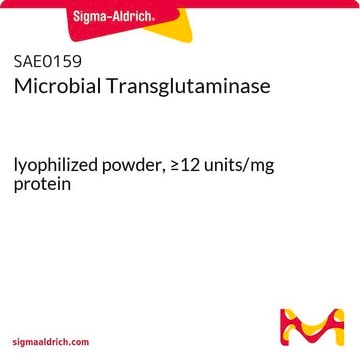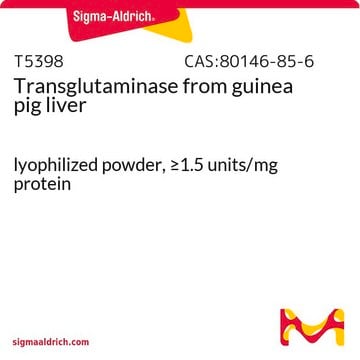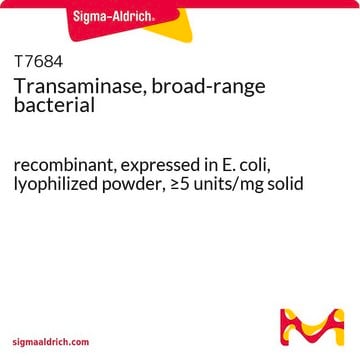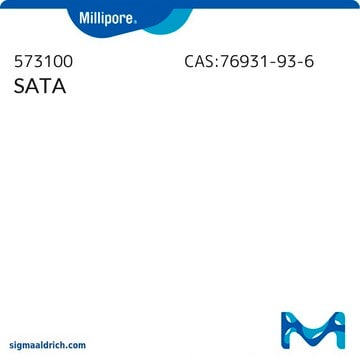SAE0217
Enhanced Microbial Transglutaminase

Glycosylation tolerant, for site-specific antibody bioconjugation
Sinónimos:
Protein-Glutamine-γ-Glutamyltransferase, Protein-glutamine:amine γ-glutamyltransferase, eMTG
Iniciar sesiónpara Ver la Fijación de precios por contrato y de la organización
About This Item
UNSPSC Code:
12352204
Productos recomendados
recombinant
expressed in E. coli
Quality Level
specific activity
≥30 units/mg protein
shipped in
dry ice
storage temp.
-10 to -25°C
General description
eMTG (Enhanced Microbial Transglutaminase) is an enzyme that catalyzes the formation of new isopeptide bonds between the primary amine of a drug linker and glutamine residues at position Q295 of IgG-type antibodies to produce site-specifically conjugated antibody-drug conjugates (ADCs).
Application
Site-specific conjugation is increasingly used in drug research, development, and manufacturing to produce ADCs and bioconjugates with defined drug-to-antibody ratios (DAR) since the resulting homogeneity improves safety and efficacy. Transglutaminase (TG)-mediated bioconjugation is a promising means of conjugating drug linkers specifically to the Q295 position of antibodies. However, its use traditionally requires antibody or glycan engineering since the adjacent glycosylation at N297 interferes with the TG reaction. If you are interested in trying eMTG to make therapeutic ADCs but do not currently have the conjugation setup/expertise, please consider ADC Express™ Service for pre-clinical lead candidate selection.
Features and Benefits
• Increased efficiency - with one-step bioconjugation for ADCs
• Glycosylation-tolerant - no need to remove glycosylation allowing for a preserved glycan on the antibody conjugate product
• Built for purpose - eMTG has been designed for producing ADCs and bioconjugates
• For higher-grade quality suitable for cGMP manufacturing of ADCs, please reach out using this form https://www.sigmaaldrich.com/US/en/services/contract-manufacturing/adc-bioconjugation/adc-bioconjugation-request-information with eMTG selected.
• Glycosylation-tolerant - no need to remove glycosylation allowing for a preserved glycan on the antibody conjugate product
• Built for purpose - eMTG has been designed for producing ADCs and bioconjugates
• For higher-grade quality suitable for cGMP manufacturing of ADCs, please reach out using this form https://www.sigmaaldrich.com/US/en/services/contract-manufacturing/adc-bioconjugation/adc-bioconjugation-request-information with eMTG selected.
Unit Definition
One unit will catalyze the formation of 1.0 micromole of hydroxamate per minute from N Z GLN-GLY and hydroxylamine at pH 6.0 at 37°C.
signalword
Danger
hcodes
pcodes
Hazard Classifications
Resp. Sens. 1
Storage Class
11 - Combustible Solids
wgk_germany
WGK 1
Certificados de análisis (COA)
Busque Certificados de análisis (COA) introduciendo el número de lote del producto. Los números de lote se encuentran en la etiqueta del producto después de las palabras «Lot» o «Batch»
¿Ya tiene este producto?
Encuentre la documentación para los productos que ha comprado recientemente en la Biblioteca de documentos.
Stephan Dickgiesser et al.
Bioconjugate chemistry, 31(4), 1070-1076 (2020-03-07)
Site-specific bioconjugation technologies are frequently employed to generate homogeneous antibody-drug conjugates (ADCs) and are generally considered superior to stochastic approaches like lysine coupling. However, most of the technologies developed so far require undesired manipulation of the antibody sequence or its
Stephan Dickgiesser et al.
Methods in molecular biology (Clifton, N.J.), 2012, 135-149 (2019-06-05)
Antibody-drug conjugates (ADCs) are a relatively young class of cancer therapeutics that combine the superior selectivity of monoclonal antibodies (mAbs) with the high potency of cytotoxic agents. In the first generation of ADCs, the toxic payload is attached to the
Nuestro equipo de científicos tiene experiencia en todas las áreas de investigación: Ciencias de la vida, Ciencia de los materiales, Síntesis química, Cromatografía, Analítica y muchas otras.
Póngase en contacto con el Servicio técnico









